Funded Projects
Funded Projects
A way to make Europe
A way to make Europe
At Repsol, we are carrying out various projects that have received funding from the financial assistance program for energy efficiency in SMEs and large businesses in the industrial sector, which is co-financed by the European Regional Development Fund (ERDF), coordinated by IDAE, and managed by each autonomous community.
A Coruña Industrial Complex
- ETBE/MTBE electric heater
- Energy efficiency improvement
- Low pressure section modifications
- APEX HDS1
- New Preflash Column Crude Oil 2
- EVEN system
- HDS2 energy improvement
- Energy improvement in the steam network
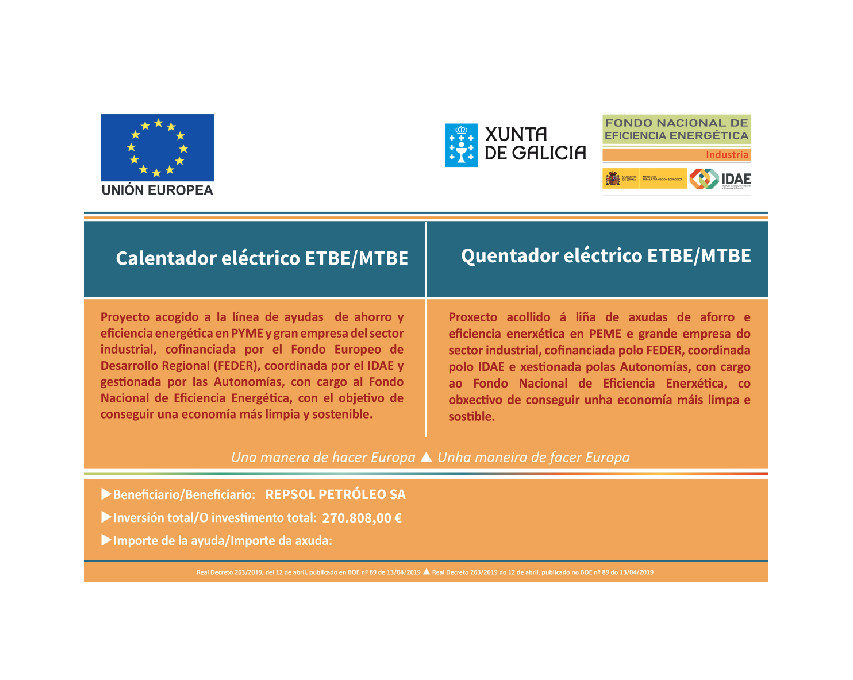
ETBE/MTBE electric heater
ETBE/MTBE electric heater
An electrical preheating system has been installed at the 450-C-1 reactor, to ensure the reactor temperature at 40ºC and guarantee the process reaction. The effluent from the first reactor has also been used to preheat the load in the existing 450-E-101N exchanger, avoiding the consumption of low-pressure steam. Thanks to the project, energy savings of 334.28 toe/year and 780 tCO2/year have been achieved.
This project received €81,000.00 in aid from the financial assistance fund for energy efficiency and savings in SMEs and large businesses in the industrial sector, which is co-financed by the European Regional Development Fund (ERDF), coordinated by the Institute for Energy Diversification and Savings (IDAE), and managed by the Energy Institute of Galicia, with the aim of achieving a cleaner, more sustainable economy.
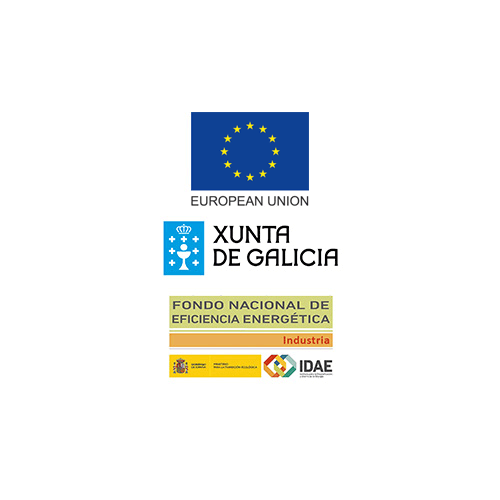
Improving energy efficiency in the Crude-1 plant at the A Coruña Industrial Complex
Improving energy efficiency in the Crude-1 plant at the A Coruña Industrial Complex
We are carrying out an energy efficiency improvement project at the Crude-1 Industrial Complex in A Coruña that consists in the installation of two new heat exchangers that recover heat from products to be used to pre-heat crude oil being sent to the furnace, and thus reduce fuel consumption in the unit's furnace. This will lead to a reduction of 5,082 tons of CO2 per year in one of the largest units at the refinery, which could mean an energy savings of 2.2341587 ktoe/year.
This €3,000,000 investment is part of Repsol's 25/25 Plan for emissions reductions. The project has received aid amounting to €1,080,000 from the financial assistance fund for energy efficiency and savings in SMEs and large businesses in the industrial sector, which is co-financed by the European Regional Development Fund (ERDF), coordinated by the Institute for Energy Diversification and Savings (IDAE, in Spanish), administered by the Energy Institute of Galicia (INEGA, in Galician), and paid out of the National Energy Efficiency Fund, with the objective of achieving a cleaner, more sustainable economy.

Modifications in the low pressure section (stripper) of UNIFINER 2
Modifications in the low pressure section (stripper) of UNIFINER 2
At the REPSOL PETROLEO industrial complex in A Coruña, a project has been carried out involving a series of modifications in the low pressure section (stripper) of the Unifiner 2 unit aimed at achieving its operational and energy optimization. This project consists in replacing the stripper plates and five control valves, incorporating recirculation for minimum flow in pump P-P4A/B, and installing a variable speed drive for engine P-E4.
These modifications will lead to energy savings of 0.585548 ktep/year, thereby avoiding 1,373.48 tCO2/year of emissions into the atmosphere, which results in direct natural gas and electricity savings for the complex.
This €258,958.50 project received financial aid worth €75,147.97 from the financial assistance fund for energy efficiency and savings in SMEs and large businesses in the industrial sector, which is co-financed by the European Regional Development Fund (ERDF), coordinated by IDAE, administered by the autonomous communities, and paid out of the National Energy Efficiency Fund, with the objective of achieving a cleaner, more sustainable economy.
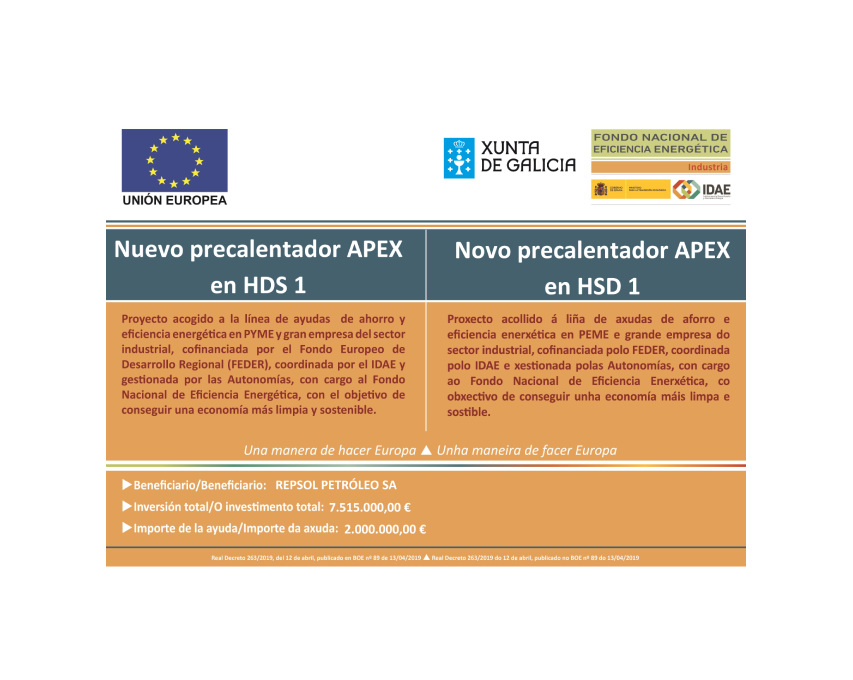
APEX HDS1
APEX HDS1
An APEX preheater has been incorporated to reduce the temperature of the fumes and improve the efficiency of the furnaces, reducing fuel consumption in unit 641, HDS1. To this end, the furnace floor has been modified and the burners have been replaced to adapt the furnace draught from natural to forced. Thanks to this action, energy savings of 4,416.95 toe/year and 10,012.95 tCO2/year have been achieved.
This action has received financial support of €2,000,000 through the energy savings and efficiency aid programme for SMEs and large companies in the industrial sector, co-financed by the European Regional Development Fund (ERDF), coordinated by the IDAE, and managed by the Instituto Enerxético de Galicia, with the aim of achieving a cleaner and more sustainable economy.
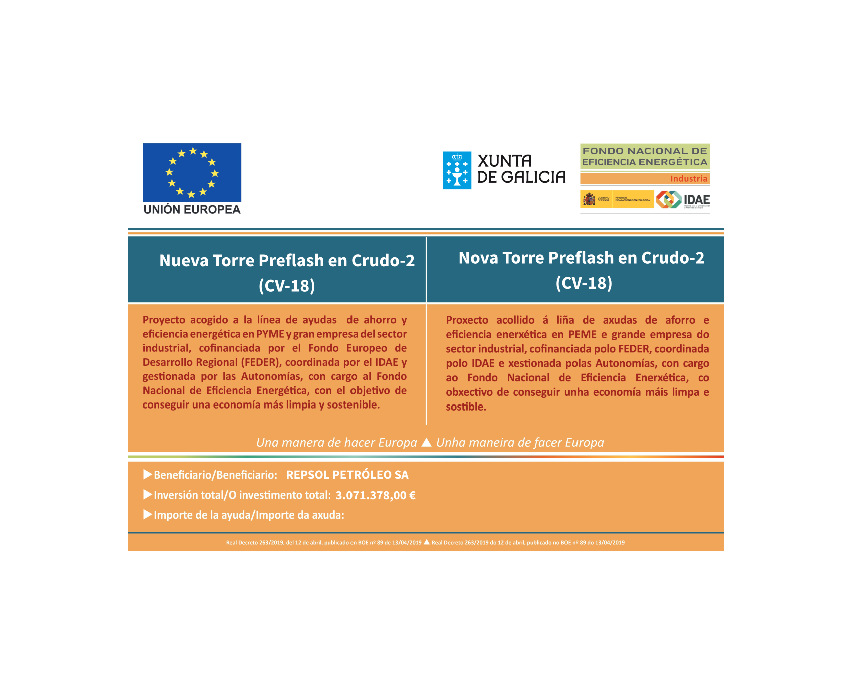
New Preflash Column Crude Oil 2
New Preflash Column Crude Oil 2
A Preflash Tower has been incorporated at the outlet of the desalinator to reduce the consumption of fuel gas in the furnace of Unit C-H1. To this end, a plate heat exchanger and the impeller replacement and motor in the C-P2 pump have also been added. Thanks to these actions, energy savings of 8,928.16 toe/year and 20,709 tCO2/year have been achieved.
This action has received financial support of €921,413.40 through the energy savings and efficiency aid programme for SMEs and large companies in the industrial sector, co-financed by the European Regional Development Fund (ERDF), coordinated by the IDAE, and managed by the Instituto Enerxético de Galicia, with the aim of achieving a cleaner and more sustainable economy.

EVEN system
EVEN system
An EVEN System has been incorporated in the C-H1 Furnace of the Crude Oil Unit 2, which reduces the O2 % in fumes, but without producing any unburnt products, homogenising combustion in all the burners. Thanks to this action, energy savings of 372.78 toe/year and 872.00 tCO2/year have been achieved.
This action has received financial support of €73,387.10 through the energy savings and efficiency aid programme for SMEs and large companies in the industrial sector, co-financed by the European Regional Development Fund (ERDF), coordinated by the IDAE, and managed by the Instituto Enerxético de Galicia, with the aim of achieving a cleaner and more sustainable economy.

HDS2 energy improvement
HDS2 energy improvement
A new shell and tube exchanger has been incorporated to preheat the gasoil mixture before it enters the F-1 furnace and thus reduce the consumption of natural gas in this furnace. Thanks to this action, energy savings of 778.71 toe/year and 1,822.00 tCO2/year have been achieved.
This action has received financial support of €304,946.70 through the energy savings and efficiency aid programme for SMEs and large companies in the industrial sector, co-financed by the European Regional Development Fund (ERDF), coordinated by the IDAE, and managed by the Instituto Enerxético de Galicia, with the aim of achieving a cleaner and more sustainable economy.
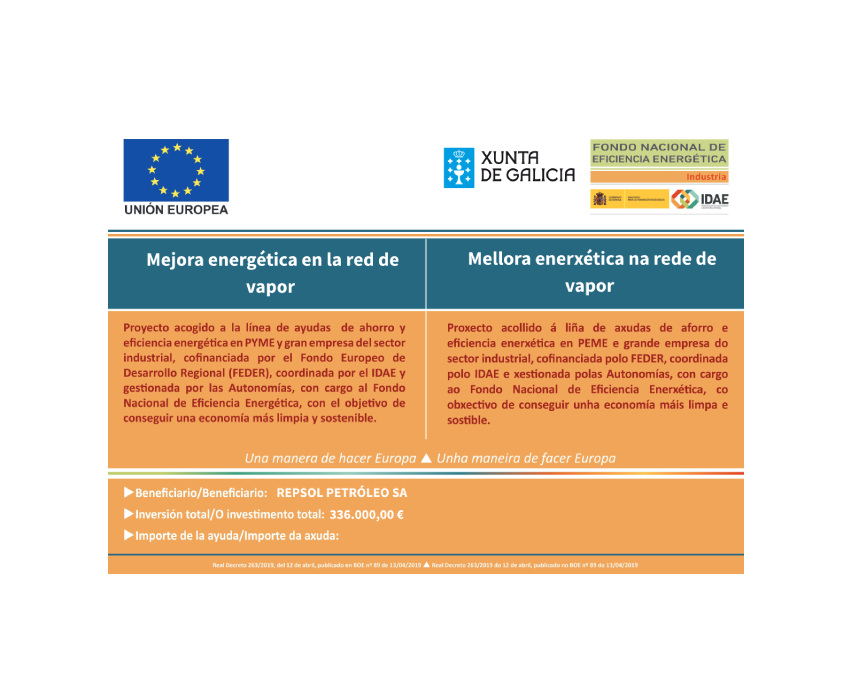
Energy improvement in the steam network
Energy improvement in the steam network
Energy losses in the low-pressure steam network and condensate recovery have been reduced by reducing steam pressure from 18 bar to 6 bar and reducing steam consumption in the asphalts area, U714, as well as recovering low-pressure condensate in the Tank area, U724. Thanks to these actions, energy savings of 424.86 toe/year and 994.00 tCO2/year avoided have been achieved.
This action has received financial support of €100,800.00 through the energy savings and efficiency aid programme for SMEs and large companies in the industrial sector, co-financed by the European Regional Development Fund (ERDF), coordinated by the IDAE, and managed by the Instituto Enerxético de Galicia, with the aim of achieving a cleaner and more sustainable economy.
Tarragona Industrial Complex
- Increased heat recovery for gas desulfurizer
- U-651 naphtha HDS heat exchanger train
- Increase in atmospheric waste heat recovery
- New flare gas recovery compressor in Tarragona
- New exchangers and sulfur adsorbent bed in U-651
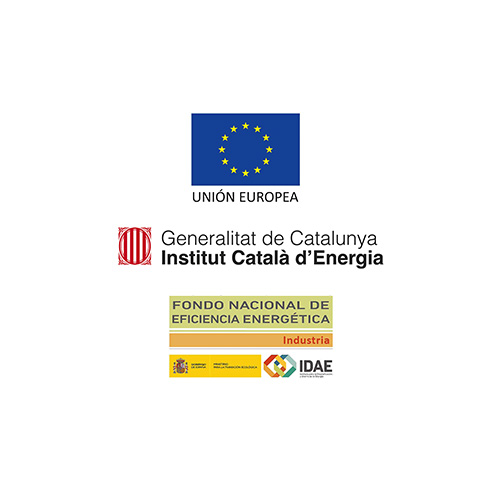
Increased heat recovery for gas desulfurizer
Increased heat recovery for gas desulfurizer
Three new 645-E-4-G/H/I exchangers have been added to the existing E-4-A/F exchanger so that the liquid product is hotter upon reaching the fractionation column called "Stripper C-7." As a result, this reduces the consumption of fuel gas in the F-2 reboiler furnace.
This project received €196,248.55 in aid from the financial assistance fund for energy efficiency and savings in SMEs and large businesses in the industrial sector, which is co-financed by the European Regional Development Fund (ERDF), coordinated by the Institute for Energy Diversification and Savings (IDAE), and managed by the Catalan Institute for Energy, with the aim of achieving a cleaner, more sustainable economy.
These modifications have led to energy savings of 7817.7 toe/year and 1,913.4 tCO2/year in emissions avoided.

U-651 naphtha HDS heat exchanger train
U-651 naphtha HDS heat exchanger train
The 651-C-H heat exchangers have been replaced, featuring improved characteristics compared to the existing equipment, to recover more heat from the product that must be cooled, which reduces fuel gas consumption in the F-1 unit's loading furnace.
This project received €681,629.61 in aid from the financial assistance fund for energy efficiency and savings in SMEs and large businesses in the industrial sector, which is co-financed by the European Regional Development Fund (ERDF), coordinated by the Institute for Energy Diversification and Savings (IDAE), and managed by the Catalan Institute for Energy, with the aim of achieving a cleaner, more sustainable economy.
This upgrade has led to energy savings of 766.24 toe/year and 1,793 tCO2/year in emissions avoided.

Increase in atmospheric waste heat recovery
Increase in atmospheric waste heat recovery
Two new heat exchangers, 613-E-9-C and 613-E-104-C, were installed in series with the current exchangers, 613-E-9-A/B and 613-E-104-A/B, in order to recover more heat from the so-called "atmospheric waste," which will lead to a reduced consumption of fuel gas in the 613-F-1 furnace thanks to the preheating of crude oil feedstock.
This project received €131,411.69 in aid from the financial assistance fund for energy efficiency and savings in SMEs and large businesses in the industrial sector, which is co-financed by the European Regional Development Fund (ERDF), coordinated by the Institute for Energy Diversification and Savings (IDAE, in Spanish), and managed by the Catalan Institute for Energy, with the aim of achieving a cleaner, more sustainable economy.
These modifications have led to an energy savings of 603.54 toe/year and 1,412.3 tCO2/year in emissions avoided, as well as a reduction in natural gas purchases at the Tarragona Industrial Complex.

New flare gas recovery compressor in Tarragona
New flare gas recovery compressor in Tarragona
At the Repsol Petróleo industrial complex in Tarragona, a new compressor was installed for the Flare Gas Recovery Plant (U 425), with the aim of recovering the fuel contained in the gas from processing units that otherwise would be used for flaring. In this way, 1,321.73 toe/year of thermal energy would be recovered, thereby avoiding 2,757.11 tons of CO2/year of emissions into the atmosphere, and which means a direct savings of natural gas at the complex.
The €2,383,363.63 project received aid worth €715,009.09 from the financial assistance fund for energy efficiency and savings in SMEs and large businesses in the industrial sector, which is co-financed by the European Regional Development Fund (ERDF), coordinated by IDAE, administered by the autonomous communities, and paid out of the National Energy Efficiency Fund, with the objective of achieving a cleaner, more sustainable economy.

New exchangers and sulfur adsorbent bed in U-651
New exchangers and sulfur adsorbent bed in U-651
A new 653-E-XX1 exchanger has been added to heat naphtha by recovering residual heat from kerosene. On the other hand, a new sulfur adsorbent bed 651-C-XX1 has been added to reduce the sulfur content in naphthas, so that this can be fed directly to the 651-C4 stripper. These actions allow energy savings in reaction furnaces 651-F-1 and reboiler 651-F-2, which are part of the naphtha desulfurization unit U-651. Thanks to these actions, energy savings of 1,374.20 toe/year and 4,026.72 tCO2/year avoided have been achieved.
This action has received financial support of €436,564.71 through the energy savings and efficiency aid programme for SMEs and large companies in the industrial sector, co-financed by the European Regional Development Fund (ERDF), coordinated by the IDAE, and managed by the Catalan Institute for Energy, with the aim of achieving a cleaner and more sustainable economy.
Puertollano Industrial Complex
- Combustion optimization system
- LED lighting installation
- Improvements in steam network
- Kerosene optimization
- Energy integration improvement in U-643
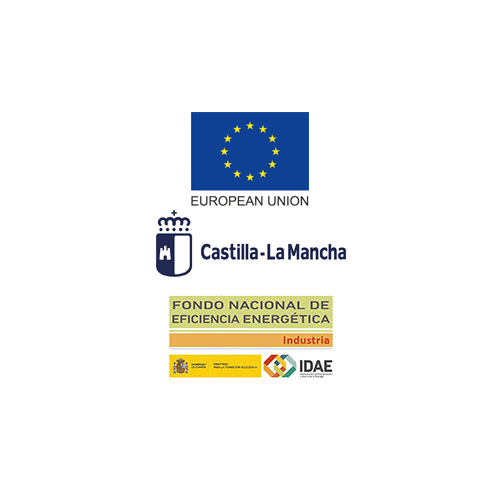
Combustion optimization system in the Crude-2 furance at Puertollano
Combustion optimization system in the Crude-2 furance at Puertollano
At the Repsol Petróleo industrial complex in Puertollano, a combustion optimization system was installed that allows for control of air that flows through the burners of the 602-F-001 burner in the no. 2 (U602) crude oil distillation unit, which will lead to a thermal energy savings of 0.674 ktoe/year, thereby avoiding 1,970.89 tCO2/year of emissions into the atmosphere, a direct natural gas savings for the facility.
This €95,525 project received support of €28,657.50 from the financial assistance fund for energy efficiency and savings in SMEs and large businesses in the industrial sector, which is co-financed by the European Regional Development Fund (ERDF), coordinated by IDAE, administered by the autonomous communities, and paid out of the National Energy Efficiency Fund, with the objective of achieving a cleaner, more sustainable economy.

LED lighting installation in streets at Repsol's Puertollano complex
LED lighting installation in streets at Repsol's Puertollano complex
At the Repsol Petróleo industrial complex in Puertollano, refinery road and perimeter lighting has been replaced with highly efficient LED technology, which will lead to a total energy savings of 0.144 ktoe/year, thereby avoiding 556.25 tCO2/year of emissions into the atmosphere, a direct electricity savings for the complex.
This €572,000 project received support of €138,026.35 from the financial assistance fund for energy efficiency and savings in SMEs and large businesses in the industrial sector, which is co-financed by the European Regional Development Fund (ERDF), coordinated by IDAE, administered by the autonomous communities, and paid out of the National Energy Efficiency Fund, with the objective of achieving a cleaner, more sustainable economy.

Improvements in the steam network at Repsol's Puertollano complex
Improvements in the steam network at Repsol's Puertollano complex
At the Repsol Petróleo industrial complex in Puertollano, a new, more efficient deaerator that operates at very low pressure (0.2 kg/cm2g) has been installed, creating savings of 2 t/h of low pressure steam, which will lead to a thermal energy savings of 1.259 ktoe/year, thereby avoiding 3,679.95 tCO2/year of emissions into the atmosphere, a direct natural gas savings for the complex.
This €449,682.01 project received support of €115,262.70 from the financial assistance fund for energy efficiency and savings in SMEs and large businesses in the industrial sector, which is co-financed by the European Regional Development Fund (ERDF), coordinated by IDAE, administered by the autonomous communities, and paid out of the National Energy Efficiency Fund, with the objective of achieving a cleaner, more sustainable economy.

Energy optimization in kerosene production at Puertollano
Energy optimization in kerosene production at Puertollano
At the Repsol Petróleo industrial complex in Puertollano, a series of modifications have taken place in kerosene production with the aim of reducing hydrogen and fuel consumption in furnaces by separating operations for producing Jet-A1 kerosene with that of gasoil production, which will lead to a total energy savings of 1.017 ktoe/year, thereby avoiding 3,131.84 tCO2/year of emissions into the atmosphere.
This 329,743.51 project received support of €98,923.05 from the financial assistance fund for energy efficiency and savings in SMEs and large businesses in the industrial sector, which is co-financed by the European Regional Development Fund (ERDF), coordinated by IDAE, administered by the autonomous communities, and paid out of the National Energy Efficiency Fund, with the objective of achieving a cleaner, more sustainable economy.

Energy integration improvement in U-643
Energy integration improvement in U-643
At the Repsol Petróleo industrial complex in Puertollano, a series of additional heat exchangers have been installed in the existing unit 643 exchanger train, to increase the exchanger surface area and be able to reduce consumption in the furnace 643F001A, which will represent a saving of 1.77333 ktoe/year of thermal energy, thus preventing 5,196.28 tCO2/year of emissions to the atmosphere, which represents direct savings of natural gas in the complex.
This €2,032,804.06 project received support of €450,000.00 from the financial assistance fund for energy efficiency and savings in SMEs and large businesses in the industrial sector, which is co-financed by the European Regional Development Fund (ERDF), coordinated by IDAE, administered by the autonomous communities, and paid out of the National Energy Efficiency Fund, with the objective of achieving a cleaner, more sustainable economy.
Cartagena Industrial Complex
- New compressor in platforming unit #2
- New boiler installation
- New flare compressor
- New 601-F-001 preheater
- New 651-F-001/002 preheater
- New 682-F-001 preheater
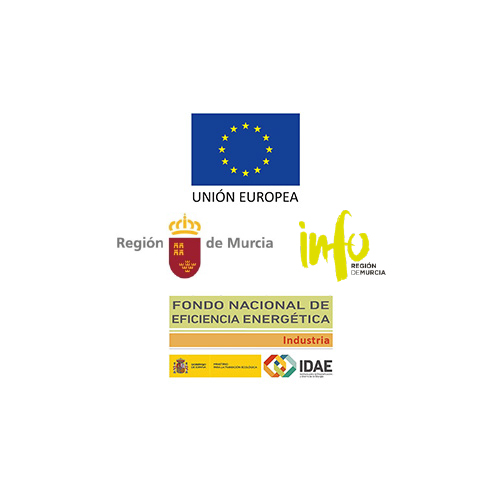
New compressor in platforming unit #2 in Cartagena
New compressor in platforming unit #2 in Cartagena
At the Repsol Petróleo industrial complex in Cartagena, a new compressor was installed in the catalytic reforming unit. The new compressor, 617K-0101, is powered by an electric motor, which replaced the previous condensing turbo-compressor. Replacing a very low-efficiency condensation turbine with a high-efficiency electric motor, in addition to a new, higher efficiency compressor results in steam energy savings. The expected savings calculated are equal to 5,536 toe/year given that the turbine’s consumption of 11 t/h of steam at 40 bar are replaced with a 946 kWh motor.
The €4,546,253 project received €313,875.90 of the eligible cost of €1,046,253 of financial aid from the financial assistance fund for energy savings in SMEs and large businesses in the indusrial sector, which is co-financed by the European Regional Development Fund (ERDF), coordinated by IDAE, administered by the autonomous communities, and paid out of the National Energy Efficiency Fund, with the objective of achieving a cleaner, more sustainable economy.

Energy efficiency improvement at the Repsol Lubricants and Specialized products Asphalts plant in Cartagena
Energy efficiency improvement at the Repsol Lubricants and Specialized products Asphalts plant in Cartagena
We are carrying out an energy efficiency improvement project at the Repsol Lubricants and Specialized products Asphalts plant in Cartagena that consists of the installation of two new thermal oil boilers with natural gas burners, of 2 MM kcal/h each. They incorporate air preheaters that recirculate the combustion fumes to preheat the boiler supply air and thus reduce the consumption of fuel, which will translate into a reduction of 271 mt of CO2 per year, from the installation's main source of energy consumption, and represents an energy saving of 81.46 tep/year.
The €730,000-project, part of Repsol's plan for the reduction of emissions, has received aid amounting to €129,314 from the financial assistance fund for energy efficiency and savings in SMEs and large businesses in the industrial sector, which is co-financed by the European Regional Development Fund (ERDF), coordinated by the Institute for Energy Diversification and Savings (IDAE, in Spanish), administered by the Institute of Development of the Region of Murcia (INFO Región de Murcia, in Spanish), and paid out of the National Energy Efficiency Fund, with the objective of achieving a cleaner, more sustainable economy.

New flare gas recovery compressor in Cartagena
New flare gas recovery compressor in Cartagena
At the Repsol Petróleo industrial complex in Cartagena, a new compressor was installed for the Flare Gas Recovery Plant (U 468), with the aim of recovering the fuel contained in the gas from processing units that otherwise would be used for flaring. In this way, 8,937.95 toe/year of thermal energy would be recovered, thereby avoiding 20,629.68 tons of CO2/year of emissions into the atmosphere, and which means a direct savings of natural gas at the facility.
The €925,537-project received aid worth €277,661.10 from the financial assistance fund for energy efficiency and savings in SMEs and large businesses in the industrial sector, which is co-financed by the European Regional Development Fund (ERDF), coordinated by IDAE, administered by the autonomous communities, and paid out of the National Energy Efficiency Fund, with the objective of achieving a cleaner, more sustainable economy.

New air preheater in the 601-F-001 furnace in Cartagena
New air preheater in the 601-F-001 furnace in Cartagena
At the Repsol Petróleo industrial complex in Cartagena, a new energy recovery system was installed that will increase the efficiency of the 601F-001 furnace in the crude oil atmospheric distillation unit, Topping 4 (U601). This will lead to a savings of 1,384.56 toe/year of thermal energy, avoiding 3,239.85 tonnes of CO2/year of emissions into the atmosphere, which means a direct savings of natural gas at the facility.
The €2,276,629.00 project received financial aid worth €682,988.70 from the financial assistance fund for energy efficiency and savings in SMEs and large businesses in the industrial sector, which is co-financed by the European Regional Development Fund (ERDF), coordinated by IDAE, administered by the autonomous communities, and paid out of the National Energy Efficiency Fund, with the objective of achieving a cleaner, more sustainable economy.

New air preheater in 651-F-001/002 furnaces in Cartagena
New air preheater in 651-F-001/002 furnaces in Cartagena
At the Repsol Petróleo industrial complex in Cartagena, a new energy recovery system was installed that will increase the efficiency of the 651F-001/002 furnaces in the Hydrocracker Unit (U651). This will lead to a savings of 1,120.17 toe/year of thermal energy, avoiding 2,621.21 tonnes of CO2/year of emissions into the atmosphere, which means a direct savings of natural gas at the complex.
The €1,529,179.00 project received financial aid amounting to €458,753.70 from the financial assistance fund for energy efficiency and savings in SMEs and large businesses in the industrial sector, which is co-financed by the European Regional Development Fund (ERDF), coordinated by IDAE, administered by the autonomous communities, and paid out of the National Energy Efficiency Fund, with the objective of achieving a cleaner, more sustainable economy.

New air preheater in the 682-F-001 furnace in Cartagena
New air preheater in the 682-F-001 furnace in Cartagena
At the Repsol Petróleo industrial complex in Cartagena, a new energy recovery system was installed that will increase the efficiency of the 682F-001 furnace in the DM3 Medium Distillate Hydrotreatment unit (U682). This will lead to a savings of 757.82 toe/year of thermal energy, avoiding 1,773.30 tonnes of CO2/year of emissions into the atmosphere, which means a direct savings of natural gas at the facility.
The €1,336,216.00 project received financial aid in the amount of €400,864.80 from the financial assistance fund for energy efficiency and savings in SMEs and large businesses in the industrial sector, which is co-financed by the European Regional Development Fund (ERDF), coordinated by IDAE, administered by the autonomous communities, and paid out of the National Energy Efficiency Fund, with the objective of achieving a cleaner, more sustainable economy.
Pinto Factory
- Self-consumption with renewable energy sources
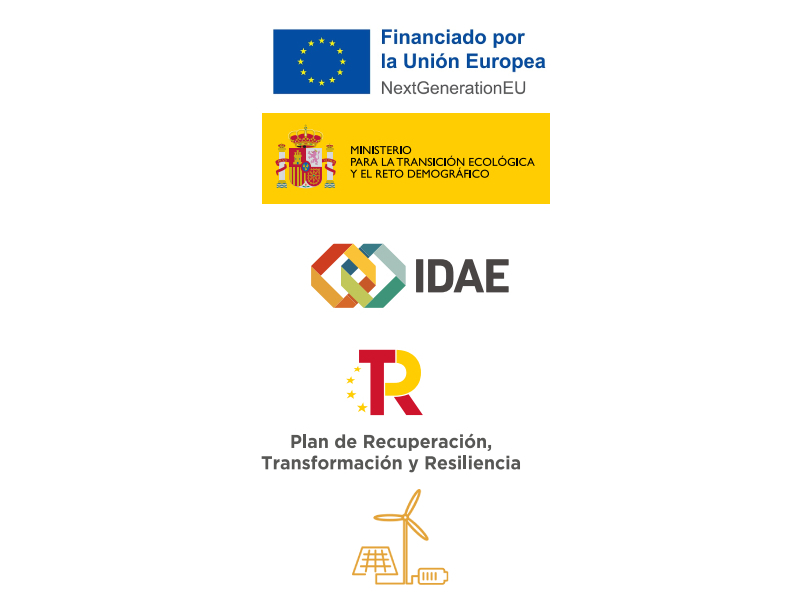
Self-consumption with renewable energy sources at Pinto LPG Factory (Madrid)
Self-consumption with renewable energy sources at Pinto LPG Factory (Madrid)
In January 2023, the photovoltaic power generation facility for self-consumption at the Pinto LPG Factory (Madrid) started up. By the end of 2023, we expect there to be eight among the thirteen LPG Factories reducing CO2 emissions in the LPG processes, to which the rest will be added in the coming years.
In Pinto's particular case, 175 kW of power has been installed which will produce just over 15% of the electricity that the Factory consumes. This sustainability improvement is the equivalent to the reduction of 140 tonnes of CO2 per year; or the planting of 190 trees annually. This new commitment to the project, internally known as Green Factory, represents significant progress in the road to an emissions-neutral future, both in our operations and marketed product.
This project, with an investment of €352,795, has obtained support worth €22,043.07 through the RD 477/2021 Aid Program for the implementation of self-consumption and storage facilities, with renewable energy sources (EERR), as well as the implementation of renewable thermal systems in the residential sector, under the framework of the Spanish Recovery, Transformation, and Resilience Plan (PRTR), funded by the European Union – Next Generation EU.
Petronor Industrial Complex
- IRIA
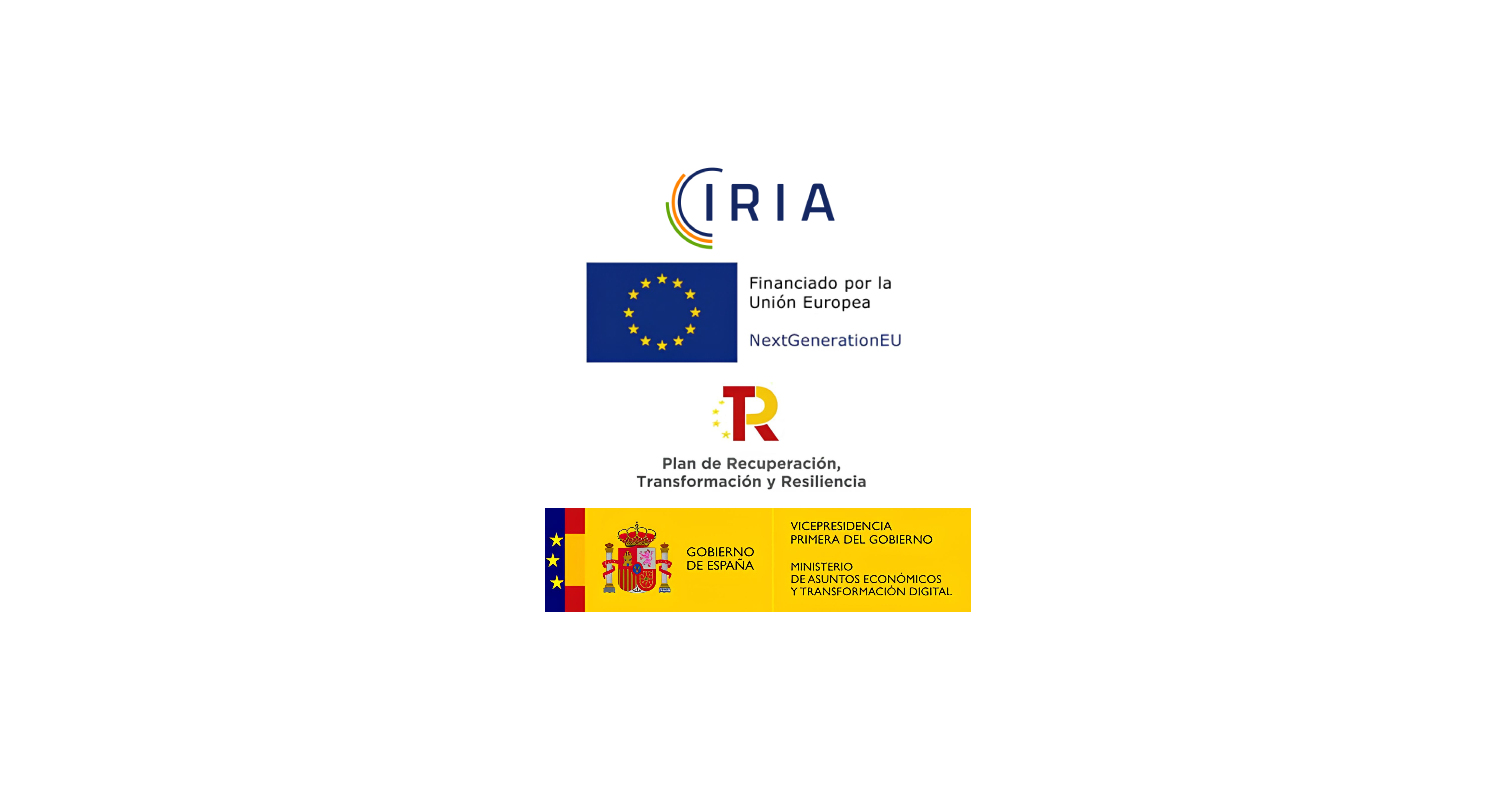
IRIA: Experimental development of a 5G platform to transform industry and improve sustainability
IRIA: Experimental development of a 5G platform to transform industry and improve sustainability
The overall objective of the IRIA project is to drive the digitalization and decarbonization of an industrial center through the development of a communications solution leveraged on 5G that enables the development of new operations and applications in an industrial environment.
This project aims to reach a new level in the digitalization of industrial environments, with critical facilities, obtaining a reliable, robust, secure, and scalable 5G communications network, which will reduce costs and generate less waste, also advancing in the strategy of low emissions and industrial decarbonization.
IRIA has a grant from the Ministry of Economic Affairs and Digital Transformation (MINECO) through the 2023 UNICO Sectorial 5G program, within the Recovery, Transformation and Resilience Plan, sponsored by the European Union with the Next Generation EU program.
